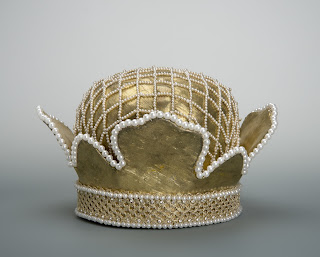Source:
https://www.sothebys.com/en/auctions/ecatalogue/2018/russian-works-of-art-faberg-icons-l18113/lot.429.html
Comprising 168 pages with printed headings 'To whom' and 'Signature' in Russian, the 713 individual entries inscribed in various hands in Russian, German, French and English, from 4 December 1897 to 22 December 1905, the first page inscribed in Russian 'From the wardrobe of Her Imperial Highness Empress Alexandra Feodorovna', leather wallet-style binding.
This newly discovered original document provides fresh insight into the life of Empress Alexandra Feodorovna, her generous and thoughtful nature, and her shopping habits. It lists the parcels she sent, with dates and recipients, presumably recorded by her ladies-in-waiting. The whole of her and the Emperor’s extended families appear, including her brother and sisters and their spouses, first and second cousins, her grandmother Queen Victoria, and her wide circle of friends, many from her childhood. There are several entries of packages to retailers across Europe. The Empress was shopping on approval, returning things she did not wish to keep, and some things may have been sent for repairs. There are fourteen entries to Fabergé, half occurring in the autumn of 1900. Touchingly, she sent an annual package of goods to the hospital her late mother had founded, Princess Alice’s Hospital in Darmstadt, probably as part of a fundraising drive.
There was of course a flurry of sending gifts around Christmas time, and the dates of many of the entries correspond to the recipient’s birthday. For example, there are three parcels to Queen Victoria, listed simply as ‘The Queen’, on 4 May 1898, sent to Balmoral, 5 December 1898, Osborne, and 6 May 1899, Windsor Castle; Queen Victoria’s birthday was 24 May. (There is an entry for ‘Osborne’ on 18 December 1897, a parcel which was also presumably a Christmas gift to the Queen.) One of these parcels may have contained the jewelled rock crystal desk clock in the Royal Collection (RCIN 40100) which is known to have been a gift from the Empress to her grandmother.
Although only a handful of entries include mention of the contents, in some cases, the contents of the parcels can be surmised from surviving objects known to have been gifts from the Empress and with their dates recorded. The Fabergé gold cigarettes case with plique-à-jour enamel dragonflies (included in the 2016 Schloss Fasanerie exhibition and illustrated, ex. cat.
Fabergé Geschenke der Zarenfamilie, Eichenzell, 2016, no. 58, p. 124) which she gave to her brother and which she had engraved ‘For darling Ernie from Nicky + Alix xmas 1900’ is listed in Fabergé’s invoice to the Imperial Cabinet with a purchase date of 30 November 1900. It was almost certainly in the package which she sent to her brother the following day, 1 December 1900. Her Christmas gift to her sister Victoria, Princess Louis of Battenberg, a Fabergé silver case inscribed in enamel ‘Alix/ Weihnachten/ 1904’ (illustrated, ibid., no. 3, p. 51), was certainly included in the parcel she sent to her on 7 December 1904, in a spree of postings on that day which also included parcels to her uncle and her husband’s aunt, Kind Edward VII and Queen Alexandra.
In addition to Fabergé, other retailers listed include the jewellers Bolin and Butz in St Petersburg; Madame Brissac, the leading couturière in St Petersburg, who made the Empress’ gowns; several other St Petersburg shops including Weiss, Tehran, Zhidkov, Malm, Alexander, and the furrier Greenwald; the photographer Pazetti; Maison Spritzer in Vienna; Maison Morin-Blossier, Paris; Edwards & Sons, who made vanity cases and jewellery in London; the jewellers Koch in Frankfurt and Wondra in Darmstadt; Walter Thornhill, dressing cases, London; the firm of Sir Pryce Pryce Jones of Newton, North Wales, who sold flannel to Queen Victoria, who knighted him in 1887, and Royal households across Europe; the London milliner Robert Heath; Pavel Buré, watches, St Petersburg; a shoemaker called Vels; Grachev, silver, St Petersburg; the Avantso shop in Moscow; Swears & Wells, makers of hosiery and gloves in London; Romanes and Patterson, Edinburgh, for tartans and cashmere; Egerton Burnette of Wellington, Somerset, who produced clothes and other soft goods; and Green & Abbott, Oxford Street, London, for chintzes and Chinese wallpaper.
The last entry, on 22 December 1905, rather poignantly, given their relationship, was to her mother-in-law, always listed in the ledger with her full style and title, who was in Copenhagen to avoid the unrest in Russia — 1905 was ‘a year of nightmares’ for the Dowager Empress — and spent Christmas there. The date corresponds to that of a letter, which was certainly enclosed in the parcel, from her son, who writes, ‘All my prayers are with you for the forthcoming holidays. This is the second time that I have to spend Christmas without you. The first time was when you were at home and we were away in India. Very sad not to have your Christmas tree again this year; it used to be so cosy upstairs at Gatchina during these holidays’ (E. Bing, ed.,
The Letters of Tsar Nicholas and Empress Marie, London, 1937, p. 205).


































